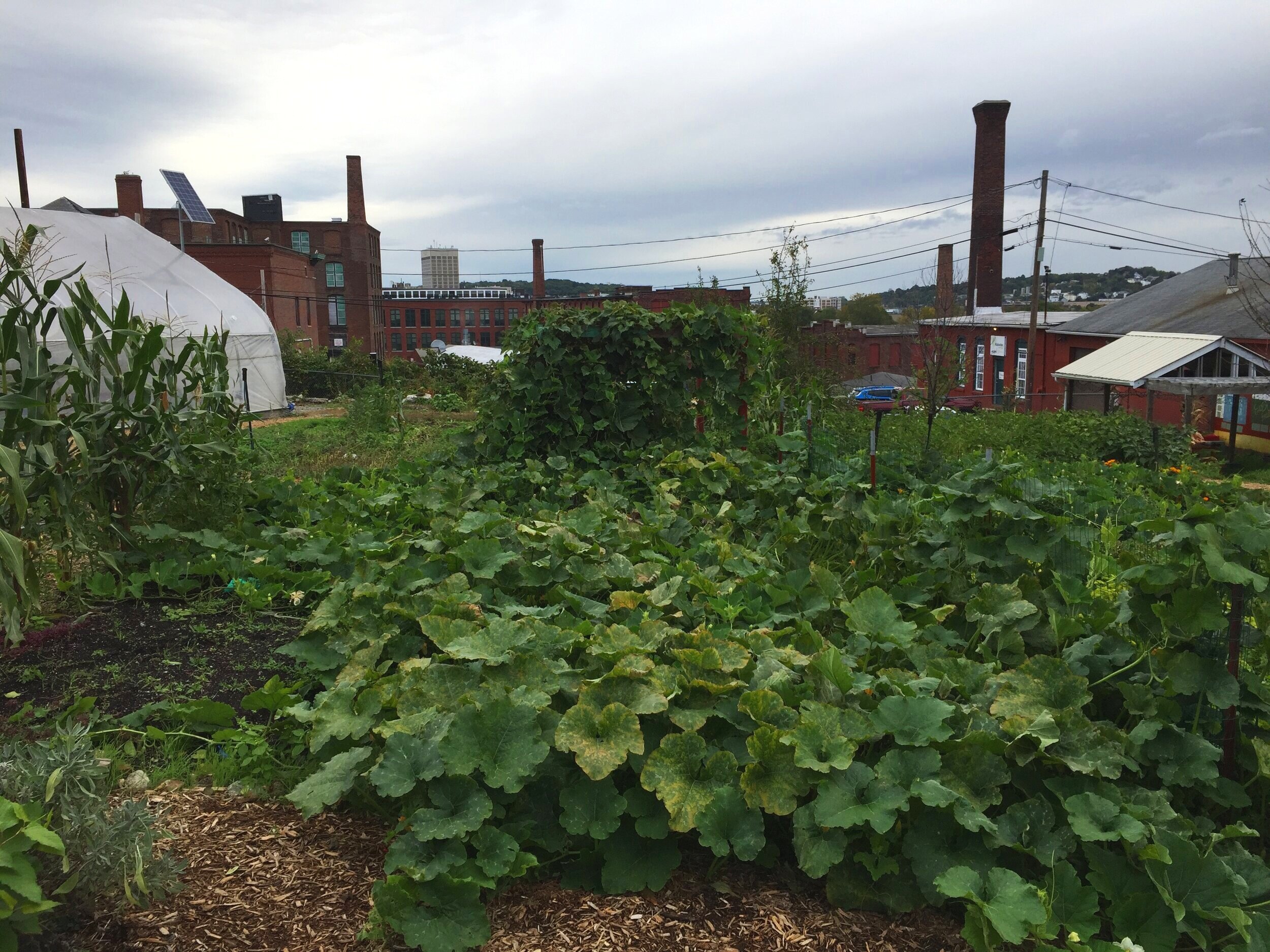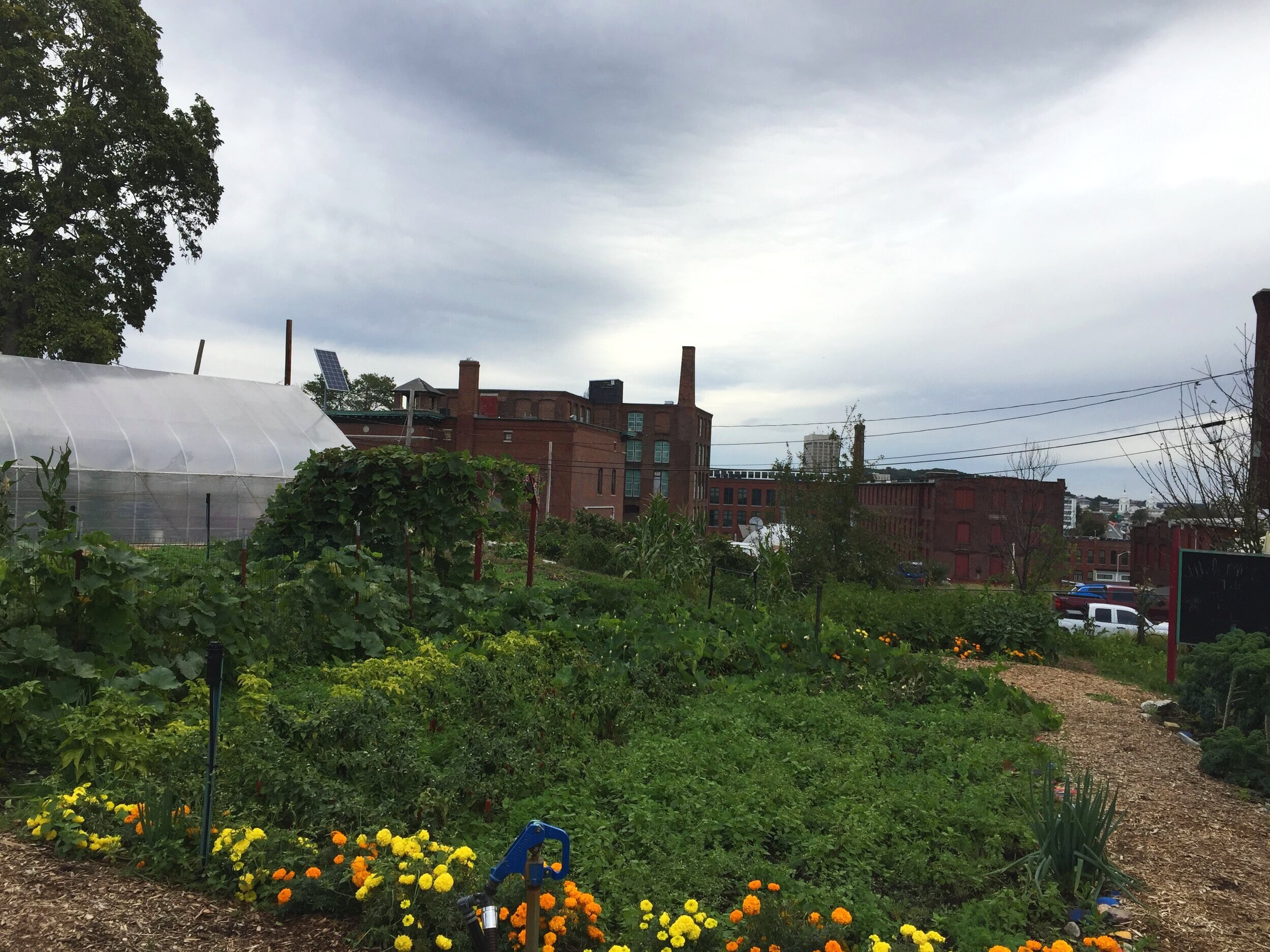Healthy Food, Healthy Community: REC nears a half-century of tending Worcester's gardens
Graphic by Michael Piazza / Photos by Margaret LeRoux
This is how the issues of conservation, climate and community play out in Worcester: A poised young woman of 17 is as skillful at leading a workshop on food justice as she is at harvesting carrots on a plot of land in the middle of the city. A young mother shopping at a farmers market adds organically grown fruit and vegetables to the food assistance she receives for her children. A pair of immigrant farmers from Cameroon helps elders from New England improve the vegetables they grow in their gardens at a senior center.
Linking them all is Worcester’s Regional Environmental Council (REC), an organization that has promoted conservation, sustainability and community for almost 50 years, since it was founded in 1971. REC took on support of community gardens in 1995, and five years ago made healthy food the conduit for its mission of environmental sustainability.
The organization has strong ties to its roots. The REC offices are in an aging brick row house on Castle Street in the heart of Main South, one of the poorest neighborhoods in Worcester. Within walking distance is a tiny urban farm where teenagers develop leadership skills while learning how to grow, harvest and market vegetables.
The two-acre farm used to be a vacant lot filled with weeds and trash. Now the lot is home to REC’s signature program, YouthGROW (Youth Growing Organics in Worcester). The program is especially meaningful to Steve Fischer, REC’s executive director, and Grace Sliwoski, REC’s program director. It’s where they both began their careers at REC.
YouthGROW started in 2003 with a few teenagers who volunteered at community gardens; today, it is a model program for youth development and leadership training whose young participants are sought after for conferences and workshops throughout the Northeast.
“We’re building leaders who will change the system,” Steve said.
One of those youth leaders is already a veteran urban farmer even though she’s still in high school. Yeimi Ayala joined YouthGROW when she was 14. “It’s changed me, and it’s changed the way I eat,” she said. Although she remembers her mom’s stories about raising corn to make pupusas in El Salvador, Yeimi, who was born in the U.S., “didn’t know anything about growing vegetables before I joined YouthGROW,” she said.
Yeimi Ayala, left, and Gabriella Guzman-Jerry, two Youth Grow staff members at REC headquarters
What attracted her to the program was the promise of a paid job. All the teenagers who are accepted into YouthGROW are paid an hourly wage during the eight weeks they work in the summer.
The YouthGROW team ranges from 35 to 40 members who follow a schedule of chores, working on the urban farm on Oread Street and on two garden plots in Grant Park in Worcester’s Belmont Hill neighborhood. During the winter they attend conferences and do community service projects. The teenagers also learn about value-added farm products. They created a salsa, called Drop It Like It’s Hot, using their homegrown hot peppers, tomatoes, onions and cilantro. They cook and bottle the sauce in an industrial kitchen and sell it through REC’s farmers markets.
These experiences are life changing. “I’m not sure I even would have considered college before I joined YouthGROW,” Yeimi said. Now, she’s looking at a range of career possibilities from social work to the hospitality industry and is applying to several colleges including UMass Amherst, Clark University and Brandeis.
The competition to join YouthGROW is intense; many of its members stay in the program throughout junior high and high school. Last year 200 young people applied for 15 open positions.
Across the city at the Worcester Senior Center is another example of REC’s mission at work. Here, retirees who eat lunch, take classes, exercise or play games reflect the city’s diverse population. They speak any of a dozen different languages, so sometimes communication is a challenge. But outside, among 27 growing spaces, the language of gardening is universal.
On a summer afternoon you might hear conversations in Albanian, Vietnamese, Spanish, Arabic or Chinese as groups of gardeners gather to compare notes on, say, tomato growth. Occasionally, plants are exchanged: a bitter melon for an eggplant along with suggestions on how to eat or cook them. Cultural differences disappear while weeding.
The Senior Center gardens are part of the original five community gardens supported by REC in 1995. Today, the organization’s Urban Garden Resources of Worcester (UGROW) is a network of 62 community gardens and 500 volunteer gardeners throughout the city, including several gardens at elementary schools.
Through a variety of partnerships and collaborations, REC provides the gardens with soil, seedlings and technical support throughout the summer. Last year, more than 5,000 organic vegetable seedlings were grown for the REC Gardens in greenhouses at The College of the Holy Cross and Worcester Polytechnic Institute.
This past summer, Philippe Kodjou and Bernadette Wadjim, a pair of retired farmers from Cameroon, came to work with the gardeners at the senior center through a partnership with Catholic Charities. “They grew corn stalks that were at least 10 feet tall,” said Patty Hainsworth, senior center operations director.
“The gardens are a big attraction,” adds Yung Phan, multi-cultural and senior services coordinator at the senior center. “They get a lot of people outside.”
Cooking demonstrations by REC staff entice elders to try food they might not ordinarily eat. Kale was not well received when samples were offered during one workshop, but later, when it was combined with flax seeds and banana in a smoothie, it was a hit.
Kale is wildly popular at the pair of farmers markets supported by REC. One is at University Park, near the campus of Clark University. The other, Beaver Brook Farmers Market, is on the west side of the city next door to the Worcester Youth Center.
With only four to six vendors, the Beaver Brook market is tiny by Boston farmers market standards but has survived for more than a decade while other farmers markets in the city have closed. Beaver Brook’s customers represent a range of ages and ethnicities. You’ll hear several different languages as they browse through baskets of corn, beans and squash.
Diversity among customers is a big plus, according to vendor David Harper. David is the fourth-generation owner of Harper’s Farm in Lancaster, which grows vegetables and fruits on 100 acres.
“We started with just corn; now we have all varieties of peppers, eggplant and squashes.” he said.
At his customers’ requests, David added eggplant from Africa and cucumbers from Asia to his produce mix. “If I get a request I will grow it the next season,” he said.
Another reason the Beaver Brook market is thriving is the state-funded Healthy Incentives Program (HIP). This program gives a rebate to recipients of the Supplemental Nutrition Assistance Program (SNAP) for every dollar they spend on fruits and vegetables.
Conor Rice, who farms two acres of organically grown vegetables at Rice’s Roots Farm in Petersham, has been a vendor at the market for three years. “Between half and two-thirds of our customers use the SNAP program,” he said.
“HIP has really helped to increase sales at the market,” said Ashley Carter, REC’s community farmers market program coordinator. “Last season we saw a 23% increase over the previous year, and we also experienced a 15% increase in sales at our mobile markets up from the previous year.”
The mobile markets are pop-ups in neighborhoods where there’s no easy access to a farmers market. They are supplied by REC’s brightly colored van—donated by the Worcester Regional Transit Authority—that transports produce sourced from 30 farms in Central Massachusetts. The van is outfitted with solar panels to power a refrigerator and freezer inside and has a grill for cooking demonstrations.
Tooling around the city, the van makes 16 stops every week at neighborhood health centers, community centers, public housing and apartment complexes. In winter, there’s a reduced schedule. REC estimates that customers of the mobile markets as well as its two stationary farmers markets generate sales between $650 and $700 a week.
“These sales disprove the myth that poor people don’t know how to eat healthy,” says REC Program Director Grace Sliwoski.
Grace points out that the issue of food justice is woven through all REC’s programs and initiatives. “The basic premise is that everyone in our community has the right to healthy, affordable food that they can access in a dignified manner,” she said.
Teenage urban farmers, elder gardeners and families who are adding local produce to their food assistance budget prove her point.
This story appeared in the Winter 2020 issue of Edible Worcester.




